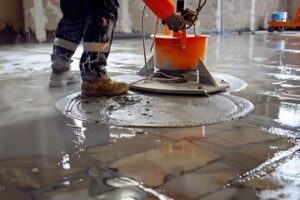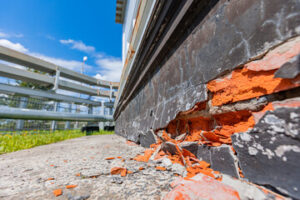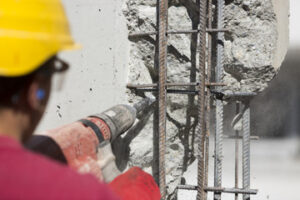Concrete Floor Polishing Orange County is a process that involves grinding and chemically densifying your existing concrete floor. This eliminates concrete porosity, which reduces abrasion and staining.

The final step involves applying a high-gloss sealant to the concrete. This creates a smooth surface free of the nooks and crannies where dust typically clings.
Preparing concrete floors for polishing is a time intensive process. It involves removing any existing flooring, scrubbing the concrete surface to remove dirt, oil and grease, using degreasers when necessary and thoroughly cleaning and rinsing the floor. Ensuring that the floor is level and filling any cracks before starting polishing is also important.
Then crews will grind the concrete with metal-bonded diamond abrasives in a variety of grits until the desired sheen is achieved. A well trained crew will know when to switch to a finer grit to achieve the best results.
This process can be a bit messy, and it’s important that crew members wear appropriate safety gear including masks, gloves and eye protection to avoid the dust and debris. It’s also crucial that crews are familiar with the equipment they are using and understand how it works to properly use it.
Concrete floors that are polished require less maintenance than other types of flooring, reducing costs for materials and labor over the course of a floor’s life-span. With proper cleaning and routine care, a polished concrete floor can last for decades.
A polished concrete floor offers limitless design opportunities, allowing you to create the perfect space for your business or home. Stains, dyes and aggregates can be mixed or layered for limitless color and design options. In addition, polished concrete does not have grout lines like tile or vinyl composite tile (VCT) which can trap dirt and grime.
It is also more durable than other types of flooring, and withstands heavy foot traffic. A properly maintained polished concrete floor requires less extensive scrubbing and waxing, which cuts down on maintenance costs.
To further extend the life and beauty of a polished concrete floor, a densifier is applied during the grinding stage. The densifier sinks into the concrete and hardens it, eliminating the need for a topcoat that can be scratched or damaged over time. Once the floor is finished, a concrete sealer may be added. It is recommended that you have your concrete contractor apply the sealer with a sprayer, rather than a mop, so it’s evenly distributed.
Grinding
Using diamond grinding tools and a variety of grit levels, the floor is ground down to achieve an even surface. A handheld grinder is suitable for small jobs, but a walk-behind machine, such as the Onfloor 20 Pro, can handle large projects with ease. Work in a systematic pattern, overlapping your passes to ensure an even result. Start with a coarse grit pad to level uneven areas and remove high spots, then gradually work in finer grit pads until you reach your desired sheen.
It is important to note that the concrete must be fully refined before a sealer can be applied. This means working through each grit level, removing the previous scratch pattern with each pass and exposing new fresh material. Not performing full refinement will cause the surface to degrade prematurely.
A concrete densifier can be used after the polishing process to further increase the durability of the floor and provide a unique sheen. The chemical reacts with the ions in the concrete to create a strong, long-lasting bond.
Before applying the densifier, it is important to scan the floor for any cracks or hazards that need to be repaired. Cracks can be filled with concrete filler, and protruding pieces of metal can be chipped out. It is also crucial to check the moisture content of the concrete, as it will affect how quickly the densifier reacts and how much material will be removed during the process.
If the concrete is too dry, it will not accept the densifier and could lead to discoloration of the finished surface. For this reason, it is important to keep a constant check on the concrete’s moisture level throughout the entire grinding and polishing process.
Grind and seal is a cost-effective alternative to laying tiles or timber flooring, especially as it allows the concrete’s existing structure to remain intact. It is also a lot easier to maintain, as it requires less frequent cleaning than other floors and is resistant to stains.
The grind and seal process gives the concrete a smooth, matte finish that is perfect for those who are looking for a more rustic industrial look or want to hide any stains from previous spillages. This is an environmentally friendly option, as it only involves the use of water to capture dust particles and turn them into a liquid slurry.
Polishing
The concrete flooring industry continues to make waves in the commercial and residential markets. As a sustainable alternative to carpets and tile, polished concrete is gaining popularity due to its affordability, durability, versatility, and aesthetic appeal. It also eliminates the need for costly, harmful adhesives and coatings. The polished concrete process involves mechanically grinding and honing the existing floor surface with bonded abrasives to achieve a desired sheen or gloss level.
Before the concrete polishing process begins, it’s crucial to prep the concrete. Cleaning the concrete surface and removing any contaminants is a must, followed by patching and then hardening with a concrete densifier. A concrete sealant is also recommended to protect the finish from water and dirt infiltration and promote longevity.
Prior to starting the polishing process, you must decide on what sheen level you want your floors to achieve. The choice will influence the type of diamond grit you begin with and will also determine how long the polishing process will take.
A level 1 ground polish can be achieved by grinding the concrete with a metal bond diamond ranging in grit from 40 to 100. A level 2 honed polish can be achieved by grinding the concrete with resin bond diamonds in the 200 – 400 grit range. At this grit level, the concrete will have a low sheen and will start to reflect light from side and overhead lighting.
As the grit ranges increase, the concrete will become increasingly smooth with more and more sheen and clarity. Once you reach a level 3 polish, the concrete will have a very high sheen and at a distance of 30 to 50 feet, it will start to reflect side and overhead lighting.
Many people are concerned that polished concrete will be slippery, but the truth is that if the concrete is properly maintained and not exposed to moisture, it will not be any more slippery than plain, unpolished concrete or even waxed linoleum. There are however, specific concrete polishing guidelines and specifications that the concrete contractor and design engineer should work together to incorporate into the project before pouring to ensure a safe and durable outcome.
Sealing
Concrete is strong, durable, and aesthetically appealing, fitting into many interior design schemes. But it’s not indestructible and will eventually degrade under certain conditions, especially if exposed to heavy traffic or other abuse. Concrete floors need to be protected from abrasion, chemical damage, and moisture. The best way to do this is with a high-quality sealer.
Depending on the environment, there are different types of sealers available for concrete floors. For instance, a penetrating sealer will fill in the pores of the concrete to protect it from oil spills and changes in weather. However, this type of sealer may change the color of the floor and make it slippery when wet. On the other hand, a topical sealer will not alter the color of the concrete and provide a glossy finish.
A final step in the polishing process is applying a chemical hardener to the surface of the concrete to make it more resistant to wear and tear. This is particularly important in areas where heavy machinery, wheeled carts, or vehicles are in frequent use. If chlorides from deicing salts or other chemicals seep into the concrete, they can corrode the steel rebar and cause cracking. The addition of a hardener will prevent this from happening.
Keeping polished concrete floors clean is crucial to maintaining their luster and longevity. Establishing a cleaning schedule of daily dust mopping and weekly wet mopping will help to keep abrasive particles from scratching the surface. A pH-neutral cleaner will also help to remove dirt buildup without damaging the concrete sealant. It’s also a good idea to encourage people to wipe their shoes on a mat at the entrance of the building and to use felt pads under furniture legs. Using harsh chemicals that are high in acidity or alkalinity will dull the shine of the concrete surface as well, so stick to cleaners formulated for polished concrete. And remember to wring mop heads well before reusing them.


